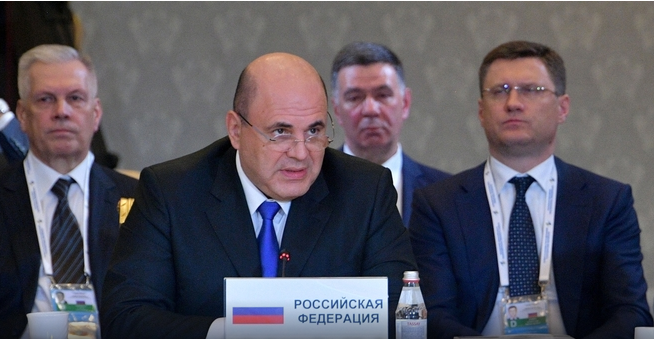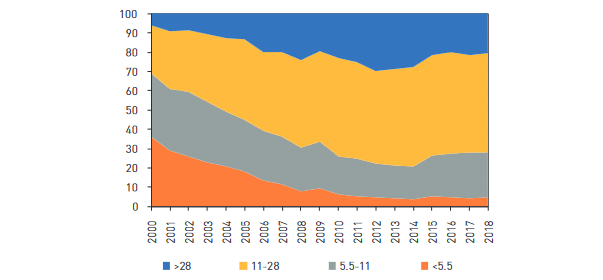While the state and state-dependent sector of the Russian economy is growing and the private sector is dying, no liberal reforms are to be expected. The task of the new government is to buy loyalty and keep society stable. Therefore it must collect as much in taxes as possible. This is why Mikhail Mishustin, who successfully transformed the Federal Tax Service, is now prime minister, argues Andrey Movchan of Carnegie Moscow Center.
by Andrey Movchan
Amid all the speculation about the recent government reshuffle and what it signifies, one thing is certain: the new Russian government was not assembled to enact change or generate ideas. On the contrary, it has all the hallmarks of one big supervisory body. Prime Minister Mikhail Mishustin and a significant number of his deputies previously worked in the Federal Tax Service, and many other ministers have come from corresponding oversight agencies.
 The new prime minister Mikhail Mishustin, expert in tax collection. Photo Government.ru
The new prime minister Mikhail Mishustin, expert in tax collection. Photo Government.ru
This supervisory government is not designed to achieve a breakthrough or rapid growth. The government’s tasks are pragmatic: to hold onto power and the cash flows that enable the authorities to buy loyalty and get rich. In addition, to eliminate the risk of losing control, society must be kept stable.
Society’s demands are well known, thanks to extensive research. People would like to see an increase in their income and standard of living, and for the state to take responsibility for that.
The two sides’ goals are not incompatible: at current oil prices, neither’s demands would require active economic growth, a diversified or more complex economy, or even a decrease in inequality.
Both sets of tasks fit in with Russia’s ongoing transition to a tripod economy resting on three supports: large monopolistic state enterprises, large private enterprises run by appointed heads and effectively managed by the state, and small enterprises that are independent of the state. The last of the three pay significant taxes for the right to work, and are tolerated by the state precisely because of that. Without their taxes, all the other taxes are really just state money recirculating through the budget.
NEP and PEP
A similar grudging tolerance of private enterprise was seen in the New Economic Policy (NEP) introduced in 1921 against the backdrop of economic collapse that followed the early years of Communist rule. President Vladimir Putin’s economic policy (PEP), in contrast, was brought in on the back of the rapid growth of the 2000s.
Despite its success, NEP was viewed by the Communists as a strategic regression from their ideals. PEP, on the other hand, is presented as moving forward, but in actual fact, the negative growth rates of the last decade, the continuing fall in household incomes (which was only stopped in 2019 thanks to an enormous effort and the issuing of one-off payments), and the stagnation of key markets are clear evidence that there is a problem.
Repeating liberal mantras about the need to make significant changes to the economy is pointless: there is neither the political will, nor demand from society. It’s more interesting to look at what will change in the functioning of the Russian power system, not as a result of the change in government, but as part of the natural development of PEP.
One obvious trend in Russia is that of a decrease in GDP not generated by the oil and state sectors. There is no hope that the non-oil and non-state sector will become a driver of revenue growth. Under the ideology of PEP, growth must be sought in the state sector, which requires centralized investment. This means that investment must come from the state itself: i.e., from the budget surplus and reserves.
Lot of state investment needed
A lot of investment is required: there’s no getting away from the fact that state investment is ineffective, but that’s not the only reason. Society, which wants stability and improvement in living standards, must be fed somehow, while the private sector is dying and no more than 5 percent of the population works in commodities.
 Welfare groups in Russia. Total expenditure per capita in US$ per day. Source: World Bank economic report December 2019
Welfare groups in Russia. Total expenditure per capita in US$ per day. Source: World Bank economic report December 2019
In this sense, state investment plays a Rooseveltian role: providing people with work and food rations via a state salary and involving what’s left of private business in state contracts. But state investment has a very low rate of return; the money essentially recirculates. In order to pay salaries from it (and, along the way, pay millions of officials, state sector workers including teachers and doctors, as well as pensioners and so on), it must be swiftly received back into the budget.
Since printing money isn’t an option considered by the Kremlin, which has studied Venezuela’s experience so closely that it prints even less than it could, money can only enter the budget via taxes, either on natural resources or on consumption.
This is a vicious circle, and the end result is that the main task of PEP is to collect as many taxes as possible. This is why the man who successfully transformed the Federal Tax Service—Mishustin—is now head of the government. And what we can expect in terms of the future development of PEP is an increased tax burden: at the very least through a further increase in the collection rate, and most probably through other measures, too.
Taxes on property, income or revenue?
Simply raising taxes is a dangerous path, as it risks sparking public resentment. Russia already has a large combined tax burden: bigger than in most developed countries, and much bigger than in the United States and China, though the devil is in the detail.
For now, Russia has relatively low property taxes, so raising these is certainly an option (for individuals, if not for industrial enterprises, which might struggle to pay). It also has a uniquely low income tax, though salaries also take into account very high social taxes.
There are those, however, who don’t pay social taxes, primarily recipients of dividends and fees, self-employed entrepreneurs, investors earning an income from property price increases, and so on. If investment is of little interest to the authorities, then raising income tax on capital revenues, including by introducing a tax on savings interest, is an obvious solution. The only thing standing in its way for now is fierce lobbying from within the authorities themselves: high-ranking officials are only human, and don’t want to pay high taxes on their savings and investments.
More new taxes could also be introduced, such as the tax on sole traders that has been gradually unrolled in recent months. If taxes are raised, then the level of inequality will decrease, which will go down well with society.
It’s unlikely that we will see any new elements in economic policy in the near future. Financing will be allocated to the national projects (a giant road map for developing Russia’s infrastructure), and the state corporations will grow, along with the number of people employed by the state sector. Taxes will continue to increase, while the redistribution of wealth among society will be ongoing. The long-serving heads of the central bank and Finance Ministry will ensure that inflation does not become a problem.
And after a while, the media and society will as usual start to criticize the authorities and expect a new wave of personnel changes, so that they can once again start making predictions and forecasting change.
This article was originally published at Carnegie.ru
